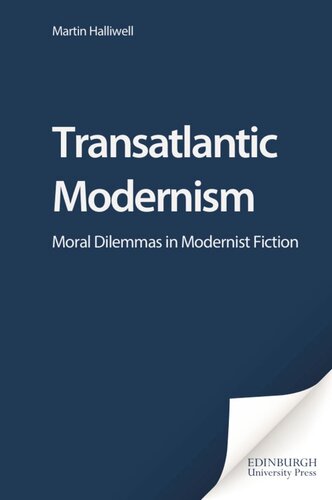

Most ebook files are in PDF format, so you can easily read them using various software such as Foxit Reader or directly on the Google Chrome browser.
Some ebook files are released by publishers in other formats such as .awz, .mobi, .epub, .fb2, etc. You may need to install specific software to read these formats on mobile/PC, such as Calibre.
Please read the tutorial at this link: https://ebookbell.com/faq
We offer FREE conversion to the popular formats you request; however, this may take some time. Therefore, right after payment, please email us, and we will try to provide the service as quickly as possible.
For some exceptional file formats or broken links (if any), please refrain from opening any disputes. Instead, email us first, and we will try to assist within a maximum of 6 hours.
EbookBell Team

5.0
18 reviewsGBS_insertPreviewButtonPopup('ISBN:9780748623938);
Transatlantic Modernism traces the intersection of artistic and moral ideas in European and American literary modernism. Rather than reading modernism as a complete rejection of social morality, this perceptive study shows how early twentieth-century writers such as Conrad, Faulkner, Gide, Kafka, Mann and Stein devised new aesthetic techniques to address ethical problems. By focusing on a range of decadent, naturalist, avant-garde and expatriate writers between the 1890s and 1940s, this book reassesses the moral trajectory of fiction on both sides of the Atlantic.
The book is divided into four parts - Part I deals with Decadence and Naturalism, Part II with Symbolic Centres of Modernism, Part III with Sexual and Cultural Difference, and Part IV with Modernist Trickery - to discuss how modernist writers forged creative, but sometimes dangerous, links between personal and social morality. The chapters alternate between considering broad literary trends, such as the European avant-garde, American writers in Paris and the modernist picaresque, and the close study of influential texts, includingThe Immoralist, Death in Venice, The Secret Agent, The Sound and the Fury, Amerika and Mephisto. In response to the recent emergence of ethical theory in the humanities and the shifting parameters of national morality in the early twentieth-first century, Halliwell's book provides a fresh and timely analysis of the ways in which transatlantic modernists used fiction as a testing-ground for moral possibility. This new paperback edition contains an updated conclusion which explores modernist continuities in the early twenty-first century, literary responses to September 11 and the shifting parameters of national morality.
Key Features